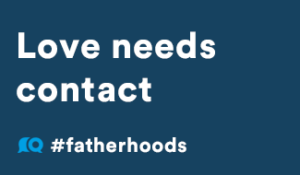More than a million children have no contact whatsoever with one or other parent after separation. Research shows that the negative impacts of separation on children can be reduced, but unfortunately some children experience behavioural problems including antisocial behaviour, distress, unhappiness and both physical and emotional problems. Children may have witnessed domestic abuse, arguments or feel that it is their fault. They can also show a range of behaviours related to the loss they are experiencing.
“I was shown in the hall… suddenly the boys came in running to me, their arms open, both shouting ‘Daddy, daddy, daddy!’ Big hugs for each one. It was like a rugby scrum only for once I was crying. They had not forgotten me.”
The NACCC is the only charity in the UK dedicated to solving this problem, by providing safe spaces where children can meet the parents they don’t live with. We oversee around 400 contact centres across the UK, run by a network of nearly 4000 volunteers. NACCC’s accreditation of supported and supervised centres is recognised as a standard quality mark for ensuring that child contact centres are run safely for children and their families. Have a look at our short video above to find out more.
How can child contact centres help?
There are a range of contact services which can be used depending on your situation and the level of risk…
Supervised contact
Is there a potential risk of harm? Supervised contact ensures the physical safety and emotional well-being of children in a one-to-one observed setting.
Supported contact
Supported contact keeps children in touch with parents if trust has broken down or communication is difficult. Parents or family members do not have to meet and several families use facilities at the same time.
Handover service
This is when the centre is used for a short period as a drop off / pick up point. Again, family members do not have to meet.
How are visits arranged?
You will have to apply to go to a contact centre. This application is called a ‘referral’. Many centres accept referrals from parents, grandparents and family members direct, but if you prefer your solicitor, mediator, social worker or Cafcass officer can make the referral for you. You and your child/grandchild will be invited to come and see the centre before your first arranged visit. This will help you get to know the centre and the staff, making your first visit easier. Please contact your local centre for more information.
Where is my nearest centre?
Go to ‘Find a Centre’ on our website, select the type of service and enter your town or postcode. The search will find the local centres in your area. You can then contact the centre direct to set up the referral.
Can you help spread the word about child contact centres?
Please go to our website to find out about our #lostparents campaign. Thank you for your support.
National Association of Child Contact Centres (NACCC),
Registered Charity No 1078638
Posted on June 28, 2018














